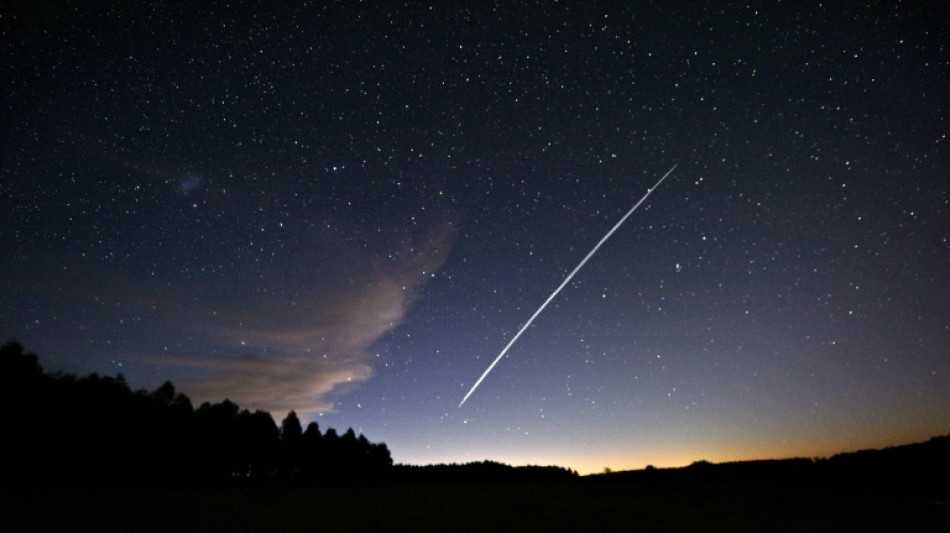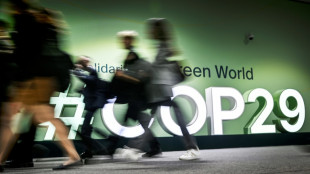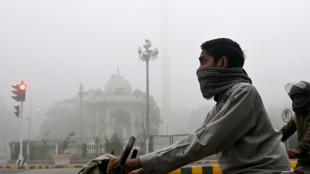
-
 UK growth slows in third quarter, dealing blow to Labour government
UK growth slows in third quarter, dealing blow to Labour government
-
Chris Wood hits quickfire double in NZ World Cup qualifying romp

-
 Markets struggle at end of tough week
Markets struggle at end of tough week
-
China tests building Moon base with lunar soil bricks

-
 Film's 'search for Palestine' takes centre stage at Cairo festival
Film's 'search for Palestine' takes centre stage at Cairo festival
-
Oil execs work COP29 as NGOs slam lobbyist presence

-
 Gore says climate progress 'won't slow much' because of Trump
Gore says climate progress 'won't slow much' because of Trump
-
'Megaquake' warning hits Japan's growth

-
 Stiff business: Berlin startup will freeze your corpse for monthly fee
Stiff business: Berlin startup will freeze your corpse for monthly fee
-
Wars, looming Trump reign set to dominate G20 summit

-
 Xi, Biden attend Asia-Pacific summit, prepare to meet
Xi, Biden attend Asia-Pacific summit, prepare to meet
-
Kyrgios to make competitive return at Brisbane next month after injuries

-
 Dominican Juan Luis Guerra triumphs at 25th annual Latin Grammys
Dominican Juan Luis Guerra triumphs at 25th annual Latin Grammys
-
Landslide win for Sri Lanka president's leftist coalition in snap polls

-
 Australian World Cup penalty hero Vine takes mental health break
Australian World Cup penalty hero Vine takes mental health break
-
As Philippines picks up from Usagi, a fresh storm bears down

-
 Tropical Storm Sara pounds Honduras with heavy rain
Tropical Storm Sara pounds Honduras with heavy rain
-
Pepi gives Pochettino win for USA in Jamaica

-
 'Hell to heaven' as China reignite World Cup hopes with late winner
'Hell to heaven' as China reignite World Cup hopes with late winner
-
Rebel attacks keep Indian-run Kashmir on the boil

-
 New Zealand challenge 'immense but fantastic' for France
New Zealand challenge 'immense but fantastic' for France
-
Under pressure England boss Borthwick in Springboks' spotlight

-
 All Blacks plan to nullify 'freakish' Dupont, says Lienert-Brown
All Blacks plan to nullify 'freakish' Dupont, says Lienert-Brown
-
TikTok makes AI driven ad tool available globally

-
 Japan growth slows as new PM readies stimulus
Japan growth slows as new PM readies stimulus
-
China retail sales pick up speed, beat forecasts in October

-
 Asian markets fluctuate at end of tough week
Asian markets fluctuate at end of tough week
-
Gay, trans people voicing -- and sometimes screaming -- Trump concerns

-
 Argentina fall in Paraguay, Brazil held in Venezuela
Argentina fall in Paraguay, Brazil held in Venezuela
-
N. Korean leader orders 'mass production' of attack drones

-
 Pakistan's policies hazy as it fights smog
Pakistan's policies hazy as it fights smog
-
Nature pays price for war in Israel's north

-
 New Zealand's prolific Williamson back for England Test series
New Zealand's prolific Williamson back for England Test series
-
Mexico City youth grapple with growing housing crisis

-
 After Trump's victory, US election falsehoods shift left
After Trump's victory, US election falsehoods shift left
-
Cracks deepen in Canada's pro-immigration 'consensus'

-
 Xi inaugurates South America's first Chinese-funded port in Peru
Xi inaugurates South America's first Chinese-funded port in Peru
-
Tyson slaps Paul in final face-off before Netflix bout

-
 England wrap-up T20 series win over West Indies
England wrap-up T20 series win over West Indies
-
Stewards intervene to stop Israel, France football fans clash at Paris match

-
 Special counsel hits pause on Trump documents case
Special counsel hits pause on Trump documents case
-
Japan's Princess Mikasa, great aunt to emperor, dies aged 101

-
 Cricket at 2028 Olympics could be held outside Los Angeles
Cricket at 2028 Olympics could be held outside Los Angeles
-
Trump names vaccine skeptic RFK Jr. to head health dept

-
 Ye claims 'Jews' controlling Kardashian clan: lawsuit
Ye claims 'Jews' controlling Kardashian clan: lawsuit
-
Japan into BJK Cup quarter-finals as Slovakia stun USA

-
 Sri Lanka president's party headed for landslide: early results
Sri Lanka president's party headed for landslide: early results
-
Olympics 'above politics' say LA 2028 organisers after Trump win

-
 Panic strikes Port-au-Prince as residents flee gang violence
Panic strikes Port-au-Prince as residents flee gang violence
-
Carsley hails England's strength in depth as understudies sink Greece

| CMSC | -0.24% | 24.55 | $ | |
| RIO | -0.31% | 60.43 | $ | |
| BP | 1.65% | 29.05 | $ | |
| BCE | -1.38% | 26.84 | $ | |
| BTI | 0.2% | 35.49 | $ | |
| SCS | -0.75% | 13.27 | $ | |
| RBGPF | 100% | 61.84 | $ | |
| BCC | -1.57% | 140.35 | $ | |
| NGG | 0.4% | 62.37 | $ | |
| JRI | -0.23% | 13.21 | $ | |
| AZN | -0.38% | 65.04 | $ | |
| GSK | -2.09% | 34.39 | $ | |
| CMSD | -0.02% | 24.725 | $ | |
| RYCEF | -4.71% | 6.79 | $ | |
| RELX | -0.37% | 45.95 | $ | |
| VOD | -0.81% | 8.68 | $ |

Astronomers sound alarm about light pollution from satellites
Astronomers on Monday warned that the light pollution created by the soaring number of satellites orbiting Earth poses an "unprecedented global threat to nature."
The number of satellites in low Earth orbit have more than doubled since 2019, when US company SpaceX launched the first "mega-constellation," which comprise thousands of satellites.
An armada of new internet constellations are planned to launch soon, adding thousands more satellites to the already congested area fewer than 2,000 kilometres (1,250 miles) above Earth.
Each new satellite increases the risk that it will smash into another object orbiting Earth, creating yet more debris.
This can create a chain reaction in which cascading collisions create ever smaller fragments of debris, further adding to the cloud of "space junk" reflecting light back to Earth.
In a series of papers published in the journal Nature Astronomy, astronomers warned that this increasing light pollution threatens the future of their profession.
In one paper, researchers said that for the first time they had measured how much a brighter night sky would financially and scientifically affect the work of a major observatory.
Modelling suggested that for the Vera Rubin Observatory, a giant telescope currently under construction in Chile, the darkest part of the night sky will become 7.5 percent brighter over the next decade.
That would reduce the number of stars the observatory is able to see by around 7.5 percent, study co-author John Barentine told AFP.
That would add nearly a year to the observatory's survey, costing around $21.8 million, said Barentine of Dark Sky Consulting, a firm based in the US state of Arizona.
He added that there is another cost of a brighter sky that impossible to calculate: the celestial events that humanity will never get to observe.
And the increase in light pollution could be even worse than thought.
Another Nature study used extensive modelling to suggest that current measurements of light pollution are significantly underestimating the phenomenon.
- 'Stop this attack' -
The brightening of the night sky will not just affect professional astronomers and major observatories, the researchers warned.
Aparna Venkatesan, an astronomer at the University of San Francisco, said it also threatened "our ancient relationship with the night sky".
"Space is our shared heritage and ancestor -- connecting us through science, storytelling, art, origin stories and cultural traditions -- and it is now at risk," she said in a Nature comment piece.
A group of astronomers from Spain, Portugal and Italy called for scientists to "stop this attack" on the natural night.
"The loss of the natural aspect of a pristine night sky for all the world, even on the summit of K2 or on the shore of Lake Titicaca or on Easter Island is an unprecedented global threat to nature and cultural heritage," the astronomers said in a Nature comment piece.
"If not stopped, this craziness will become worse and worse."
The astronomers called for drastically limiting mega-constellations, adding that "we must not reject the possibility of banning them.""
They said that it was "naive to hope that the skyrocketing space economy will limit itself, if not forced to do so," given the economic interests at stake.
S.Gregor--AMWN


